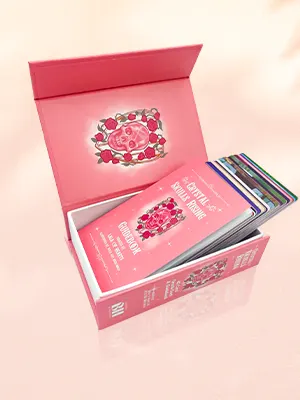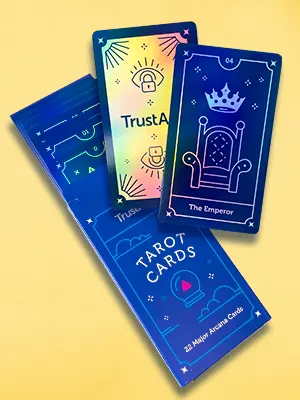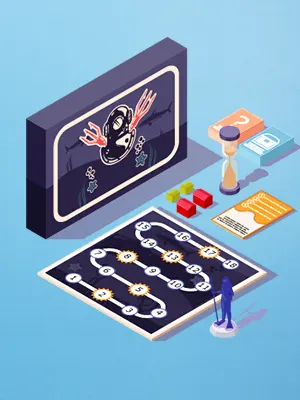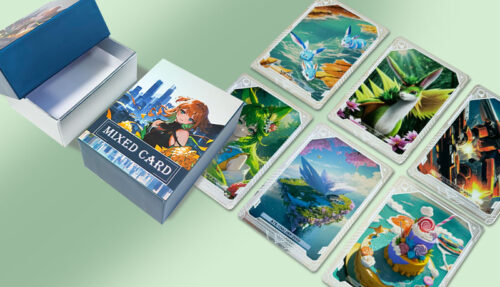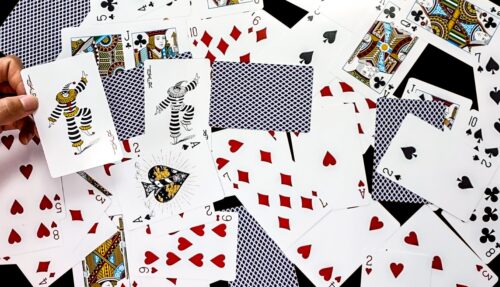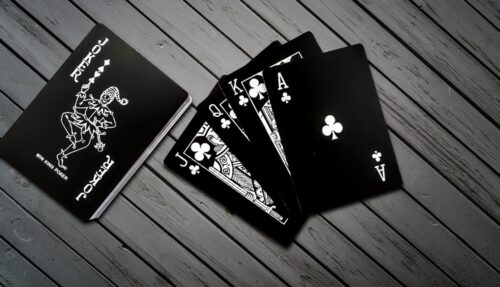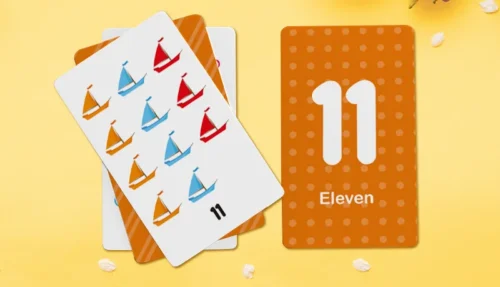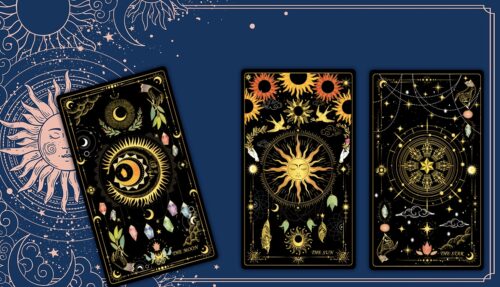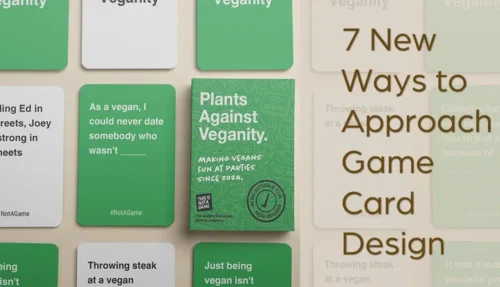Thinking of printing tarot cards to sell? We explore who buys tarot cards to help you design, market, and promote your decks successfully
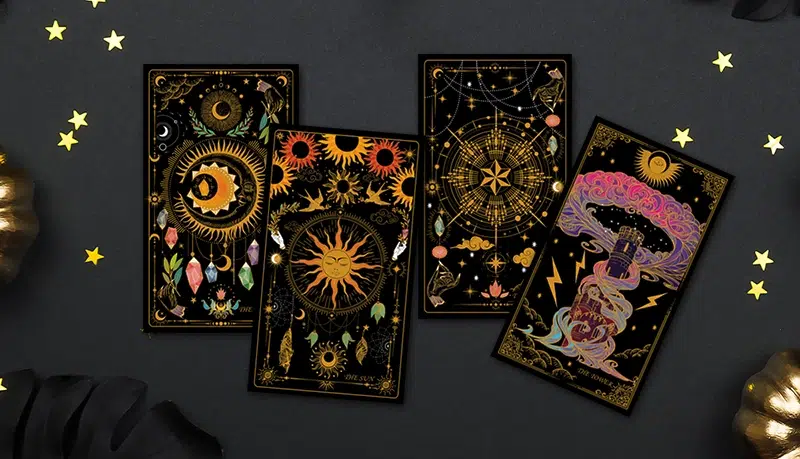
Tarot cards have intrigued everyone from medieval peasants to Fortune 500 entrepreneurs, and they’re now part of a growing market that looks set only to expand over the coming decade. As the demand for non-religious spiritual practices and personal guidance continues to rise, along with the trend to publish tarot decks as works of art, or as elements of home decoration, they have become a popular bestselling product both on and offline. Either as a tool for self-reflection, divination, and personal growth or as an ornamental object, a fine art showcase, or conversation-starting curio, tarot decks are flying off the shelves. As a world-class printer of high quality custom tarot cards, in this post we’ll look at who buys tarot cards, uncovering their motivations, interests, and other demographics. Let’s dive in and unravel the mysteries of this fascinating industry.
The rising popularity of tarot cards
In recent years, the popularity of tarot cards has seen a significant surge. With the increasing interest in spirituality, self-discovery, and alternative healing practices, more and more individuals are turning to tarot cards as a framework to make sense of their experience. The COVID-19 pandemic has also played a role in this upward trend, as people search for ways to navigate the uncertainties of life and find solace in psychotherapeutic practices.
But it’s not only that. The rise of platforms such as Kickstarter, Indiegogo, Patreon, Etsy, and others have given independent creators and artists a new empowerment to produce and sell to a dedicated community of fans and followers and many find the tarot cards an ideal form in which to express their artistic creativity. The same applies to the world of board game design. Crowdfunding and the interweb have enabled huge numbers of smart game enthusiasts to design and sell their own games and the tarot cards play a significant part in dozens of these creations.
Understanding the tarot cards market
To truly understand the tarot cards market, the first and most important thing you need to know is that it is a diverse and thriving industry, catering to a wide range of individuals with different interests and needs. From seasoned practitioners and collectors to beginners seeking self-exploration, to artists and art aficionados, to role players and board game designers, to writers looking for tools to structure stories, and so much more, there is a tarot deck for everyone. Let’s explore the various segments of the market and the factors that influence who buys tarot cards.
1. Occult enthusiasts and spiritual seekers
One of the primary consumer groups in the tarot cards market—and this won’t surprise you!—comprises occult enthusiasts and spiritual seekers; wiccans, occultists, shamans, and the like. These individuals are deeply interested in esoteric practices, divination, magic, ritual, and connecting with the spiritual realm. For them, tarot cards serve as a powerful tool for introspection, insight, and spiritual growth. They buy their tarot cards online from major stores such as Amazon, eBay, and Etsy along with the bookstores such as Barnes & Noble in the USA and Waterstones in the UK, for example. But they also buy them through small, independent retailers, stalls at conventions and meetups, and via course and training providers.
2. Individuals seeking guidance and clarity
Another segment of the market includes people who may not have a particular “spiritual” belief or inclination, but who are looking for guidance and clarity in their lives. Tarot cards provide them with a means to gain insights into their current situations, make important decisions, and find answers to their pressing questions. For these individuals, tarot readings offer a sense of direction and empowerment but more as a tool for clear thinking and self-awareness without subscribing to a particular religion or philosophy. They are the same demographic as consumers of self-help and “pop psychology” books.
3. Artists and art collectors
Tarot cards are not only tools for divination but also works of art. Many people are drawn to tarot decks for their aesthetic appeal and artistic value, and they can become passionate and avid collectors. Artists, designers, and art collectors appreciate the intricate illustrations, symbolism, and storytelling found in tarot cards. For them, collecting tarot decks is a way to appreciate art and add a beautiful and intriguing “conversation piece” to the drawing room, the coffee table, or the bookshelves.
4. Social media influencers
With the rise of social media platforms, tarot cards have gained significant visibility and popularity among younger generations. There are innumerable tarot card readers or teachers on social media platforms, such as Facebook, SnapChat, Instagram, TikTok, and more. Curious beginners, influenced by online trends, seek to explore tarot reading as a means of self-discovery and personal growth and often in a lighthearted way, much like reading the newspaper horoscope. Social media influencers, bloggers, and content creators have played a pivotal role in spreading awareness about tarot cards in the digital age, making them more accessible and appealing to a wider audience. But these young folks, eventually, want to buy their own tarot deck and as they grow older may develop a more serious interest in the product or even become collectors themselves. But the social media—whether through content marketing or direct advertising models—is a fruitful area for marketing tarot.
5. Game designers and role players
One new trend we’ve seen picking up momentum in the last few years is that of board game and roleplaying game designers and players incorporating tarot into their game designs. Usually in the fantasy genre—but we’ve seen steampunk and futuristic games that involve tarot cards, too. We predict that this is an area likely to grow even more over the next ten years. Game designers may include a traditional tarot or develop an entirely new custom tarot deck to support their game. Tarot can offer an exciting extra dimension to game mechanics, add mysticism and atmosphere, or elaborate the theme.
Factors influencing who buys tarot cards
Several factors contribute to the decision-making process in purchasing tarot cards. For businesses in the tarot cards market to effectively cater to their target audience, it is essential to understand these factors. Let’s delve into the key factors that influence who buys tarot cards.
1. Personal beliefs and interests
People who purchase tarot cards often have a genuine interest in spirituality, divination, and personal growth. Their personal beliefs and desire for self-exploration drive their decision to invest in tarot decks. Different tarot decks may resonate with individuals based on their cultural background, spiritual beliefs, or personal preferences. For selling your tarot cards, you’ll need to look at the publications this demographic reads, the blogs and forums they visit, the social media they use, the stores they go to, and the other products they enjoy related to the cards.
2. Quality and artistic appeal
Aesthetics plays a huge role in selling tarot cards. The quality and artistic appeal of tarot cards are essential considerations for potential buyers. From the cardstock quality to the illustrations and overall design, customers seek visually appealing and well-crafted decks. You can enhance your tarot by using special techniques such as metallic foil stamping, lamination, and spot UV coating, for example. And housing your cards in a beautiful custom box is a must. Not to mention adding in a beautifully laid out and printed booklet that explains the inspiration behind the deck, its uses and applications. The more you can do to elaborate the artistic and sensual appeal of your tarot cards, the more success you’ll have selling them.
3. Reputation and reviews
Reputation and reviews play a significant role in the tarot card market as they do in almost every other market these days. Buyers often rely on recommendations from friends, influencers, store reviews, and online communities to choose a reputable tarot deck. Positive reviews, testimonials, and word-of-mouth referrals can influence purchasing decisions, particularly for beginners who are new to the world of tarot. So building in a review request and generation strategy into your tarot card marketing plan will help you reach out to who buys tarot and offer them the social proof they need to buy your decks rather than those of your competitors.
4. Price and affordability
Price is an important consideration for many consumers when purchasing tarot cards. While some buyers will invest in high-end, limited-edition decks at a premium price, others seek affordable options without compromising quality. Most people who buy one tarot deck buy others, too. Offering a range of price points, designs, and styles allows card businesses to cater to a broader customer base and accommodate different budgetary constraints. So, consider an “elite” range of high-value collectibles, a medium range of good quality but affordable decks, and then one or two “budget buys” to catch the lower end of the market.
5. Deck theme and symbolism
Tarot decks come in various themes, each with its own unique symbolism and interpretation. Some individuals may be drawn to decks that align with their traditional interests, such as astrology, mythology, or nature. But there are tarot decks based on cartoons, humor, romance, abstract art, and more. The theme and symbolism of a tarot deck can resonate strongly with buyers and influence their purchasing decisions. Examine the breadth and depth of the market with care and look for new openings.
The growing tarot cards market
All the leading research and analysis suggests that the market for tarot cards is expected to expand further and become ever more profitable over the next decade. With advancements in technology and the increasing accessibility of online platforms, social media, and the parallel rise in the market for board games and alternative spirituality”, tarot cards are poised to reach new audiences and command high prices while remaining relatively economical to produce.
So, the market for tarot cards is diverse and expanding, catering to various consumer segments with different interests and needs. Understanding the factors that influence who buys tarot cards and adopting effective marketing strategies based on these demographic details are key to succeeding in this burgeoning industry.
Talk to us!
It’s never too soon to talk to us about your ideas for your custom tarot decks. We’re an enthusiastic and friendly team with decades of experience working with big publishers and independent creatives alike. We have a core commitment to personalized, customer-focused practice which is sensitive to each client as an individual whether that’s a self-publisher or a major corporation. Get in touch today for an informal chat or to ask us for a no-obligation quote on helping you design and print your perfect custom tarot card decks. We can’t wait to hear from you!

